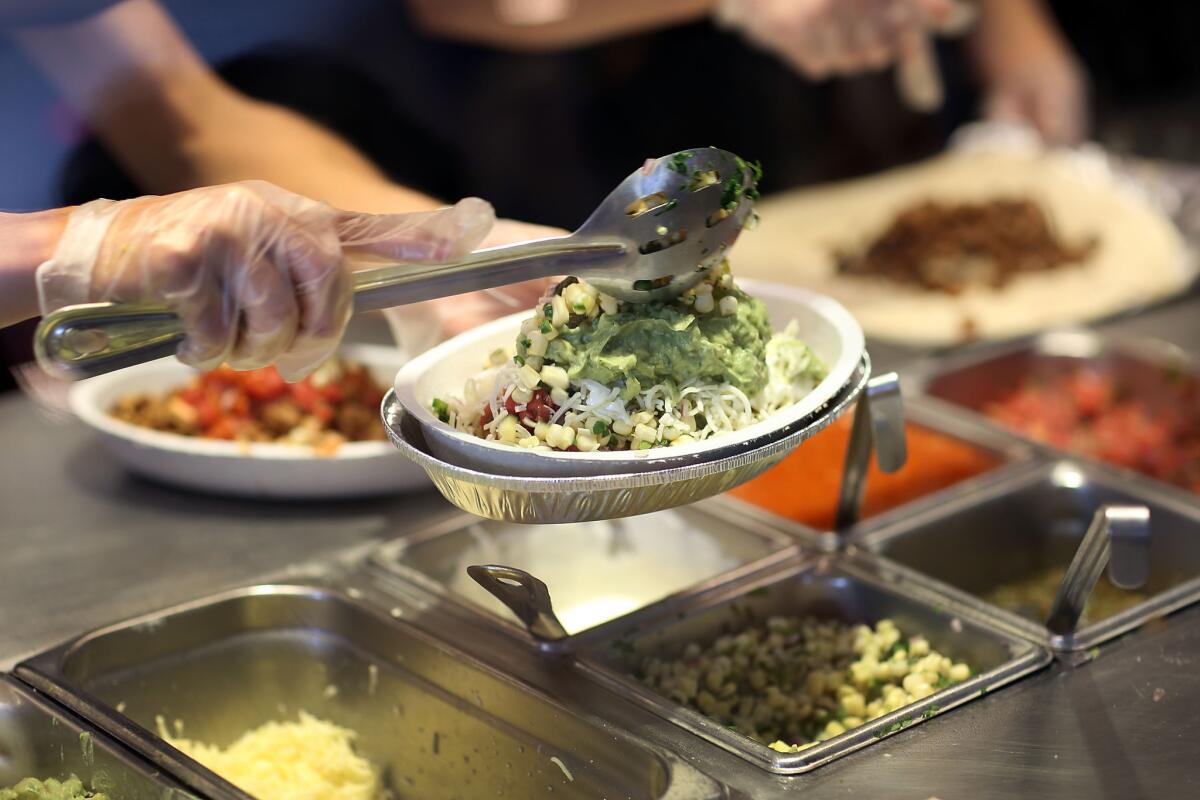Op-Ed: Chipotle’s junk science on GMOs

Chipotle’s announcement this week that safety compelled it to remove all genetically modified organisms from its food is rooted either in ignorance or in crass profit-seeking at the expense of science. More than two decades of research indicate that GMOs are not only safe for humans and the environment, but also contribute to global sustainability and poverty alleviation.
On Monday, Chipotle’s website blared that “cultivation of GMOs can damage the environment” and that most studies of GMO safety were paid for by self-interested companies pedaling GMO seeds. Also on Monday, Chief Executive Steve Ells claimed, “It’s clear that a lot of research is still needed before we can truly understand all of the implications of widespread GMO cultivation and consumption.”
A host of scientific and medical organizations, however, disagree. The U.S. Food and Drug Administration — charged specifically with ensuring our food safety — the World Health Organization, the Food and Agriculture Organization of the United Nations, the European Commission, the U.S. National Academies of Science and the American Medical Assn. are just a few that have declared GMOs safe.
In 2003, the International Council for Science, a nongovernmental body representing more than 100 national science academies and dozens of international scientific unions, reviewed 50 independent and authoritative studies. It concluded that the GMOs Chipotle banned this week “are safe to eat.” Period.
In the intervening 12 years, GMOs have been planted on nearly 4 billion acres of land in more than two dozen countries, bringing the total acreage devoted to GMOs to 5 billion. And still no credible evidence of human health risks has emerged.
Chipotle probably is responding to market forces. Polling indicates that Americans are wary of GMOs: Only about a third believe genetically modified foods are safe to eat, and nearly 60% say they’d be less likely to buy foods labeled as genetically modified.
But in misrepresenting the science surrounding a poorly understood innovation, Chipotle joins the too-populous ranks of companies that endeavor to deceive the public. Chipotle stokes the anti-GMO hysteria that threatens to marginalize a field of science that already has demonstrated important benefits. These include boosting nutrient density of staple crops for the poor, enhancing crop resiliency to climatic extremes and equipping subsistence farmers in the developing world with cash crops.
Our own review of how GMOs affect farms, for the Journal of Economic Perspectives, enumerated several environmental advantages. Chief among these is the avoided expansion of cropland into native habitat, made possible by the tremendous yield gains from genetically modified seed. Absent GMOs, we estimate that agriculture’s global footprint would be at least 25 million acres larger.
Moreover, herbicide-tolerant GM seed varieties allow farmers to replace toxic pesticides with more benign ones, and to forgo tilling operations that worsen soil depletion and nutrient runoff. Other GM seed varieties produce a naturally occurring protein that kills common crop pests and is, nevertheless, harmless to humans. These crops eliminate the need for some pesticides altogether.
We concede that this new seed technology is not risk-free. Few innovations are. Ells and Chipotle are right that the future may reveal new dangers hidden during our 20-year introduction to commercially grown GM crops. Regulators should remain vigilant, and researchers have more work to do.
But as the Harvard law professor and former regulatory czar Cass Sunstein has argued, fear of unknown, theoretical risks can paralyze and forestall innovation. Excessive caution, such as that exhibited by Chipotle, is not sound policy. It ignores the substantial benefits provided by existing GM technologies and promised by emerging ones.
The potential for genetic plant engineering is great. Realizing that potential, however, will depend on sound public policy and consumer acceptance of a technology that advances the millenniums-old practice of plant breeding to meet the challenges of the 21st century.
Steven Sexton is assistant professor of public policy and economics at Duke University’s Sanford School of Public Policy. David Zilberman is professor of agricultural and resource economics at UC Berkeley. Zilberman served on a Monsanto scientific advisory board in 2012.
Follow the Opinion section on Twitter @latimesopinion and Facebook
More to Read
Sign up for Essential California
The most important California stories and recommendations in your inbox every morning.
You may occasionally receive promotional content from the Los Angeles Times.










